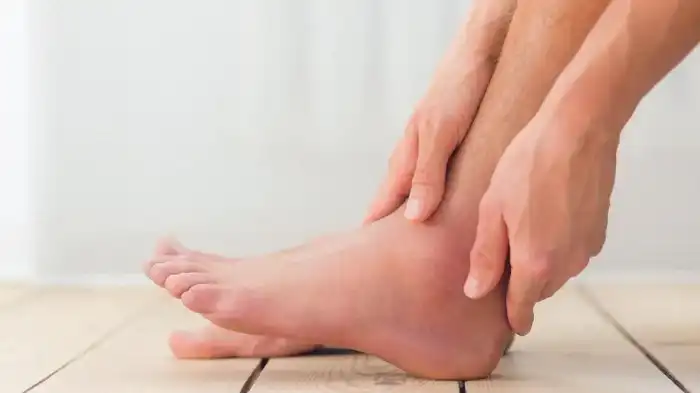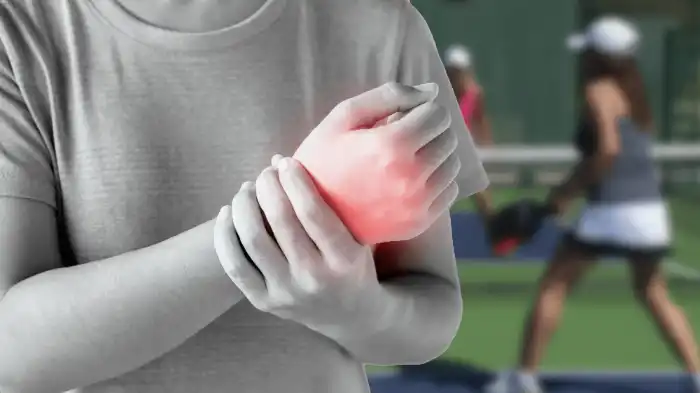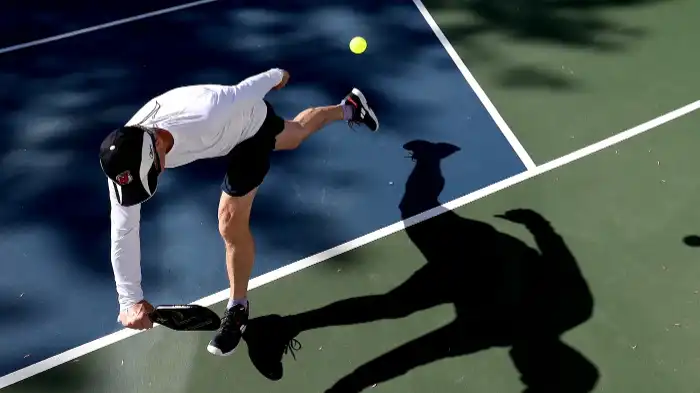Pickleball is a thrilling and rapidly growing sport, known for its accessibility to players of all ages and skill levels. However, like any physical activity, it comes with its own set of risks. In this blog, we are going to uncover the common injuries from pickleball play that you should be aware of. Understanding these potential risks is crucial for enjoying the game while taking steps to protect yourself and stay in the game. Let’s get started!
What Are the Common Injuries From Pickleball Play?
1. Ankle Sprains
Ankle sprains are one of the most common injuries in pickleball. The quick lateral movements, changes in direction, and abrupt stops during the game put stress on the ankles, making them susceptible to sprains. The risk of ankle sprains can be reduced by wearing proper footwear that provides ankle support, warming up before playing, and strengthening the ankle muscles through exercises like calf raises and ankle circles.

2. Knee Injuries
Pickleball involves a lot of running and jumping, which can put strain on the knees. The repetitive nature of these movements can lead to overuse injuries or even more severe conditions such as torn ligaments or meniscus tears. To protect your knees, it is important to wear knee pads for added support and cushioning. Strengthening the muscles around the knee, such as quadriceps and hamstrings, through exercises like squats and lunges can also be beneficial in preventing knee injuries.
3. Shoulder Strains
Shoulder strains are common in sports that involve overhead motions, including pickleball. The repetitive swinging of the paddle and overhead shots can cause strain and even lead to conditions like rotator cuff injuries. To minimize the risk of shoulder strains, it’s essential to warm up properly and stretch before playing. Additionally, maintaining good form and technique while hitting overhead shots can help to avoid unnecessary strain on the shoulder muscles.
4. Back Pain
Due to the dynamic nature of the game and the constant bending and twisting motions involved, pickleball players are susceptible to back pain and discomfort. Poor posture, inadequate warm-up, and weak core muscles can contribute to this issue. Practicing proper body mechanics, maintaining good posture during play, and strengthening the core muscles through exercises like planks and bridges can help to alleviate or prevent back pain.
5. Wrist Injuries
The repetitive use of the wrist during pickleball can lead to wrist injuries such as sprains or tendonitis. These can occur due to improper grip techniques or excessive strain on the wrist. It’s important to learn the correct grip technique and use paddles that are well-suited to your hand size and strength. Taking breaks, performing wrist stretches, and using wrist braces when needed can also help protect the wrist from injuries.

6. Tennis Elbow
Pickleball puts a significant strain on the tendons in the elbow, making tennis elbow a frequent complaint among players. This condition, medically known as lateral epicondylitis, causes pain and inflammation on the outside of the elbow. The repetitive swinging motion and the force exerted during a pickleball game can aggravate this condition. To prevent tennis elbow, make sure to warm up your forearm muscles before playing and consider using an elbow brace or strap. Taking frequent breaks and performing stretching exercises for the forearm can also help alleviate strain.
Frequently Asked Questions
To prevent common injuries from pickleball, it is crucial to warm up and stretch before playing, wear proper footwear with good ankle support, use proper technique and body mechanics, and take sufficient rest breaks to avoid overuse and fatigue.
Yes, wearing protective gear like knee and elbow pads can provide an extra layer of protection, especially for players with a history of joint or ligament issues. Additionally, maintaining a well-maintained playing surface and being aware of potential trip hazards can help reduce the risk of falling injuries.
While it is less common, playing pickleball can potentially lead to more severe injuries such as fractures or head trauma, particularly if players fall or collide with each other. It is always important to be cautious and play within your abilities, avoiding risky moves or actions that may increase the likelihood of high-impact injuries.
Repetitive wrist use can lead to injuries. Learn the correct grip technique, use suitable paddles, take breaks, stretch your wrists, and consider using wrist braces when necessary to safeguard against injuries.
Conclusion
In the world of pickleball, knowing the common injuries from pickleball is essential to ensure a safe and enjoyable experience on the court. From ankle sprains to shoulder strains, understanding these risks empowers players to take proactive steps in injury prevention. By warming up, using proper equipment, and maintaining good technique, players can minimize the chances of encountering these common injuries and continue enjoying the sport for years to come.

